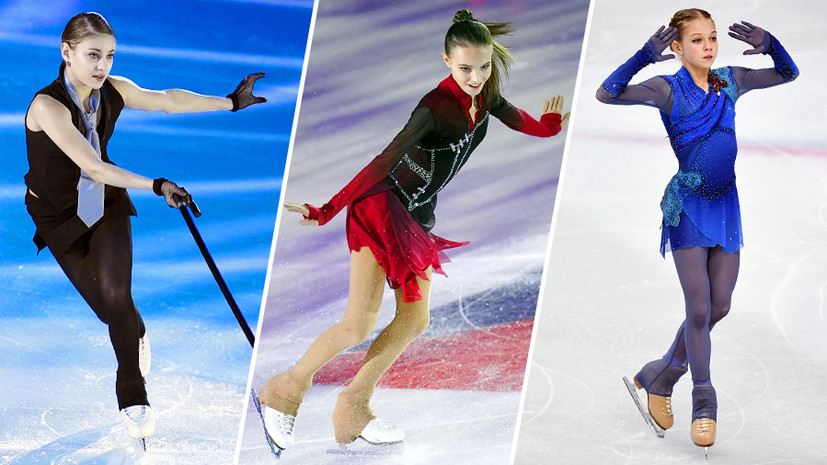The European Figure Skating Championships in the women's singles have long turned into a kind of replay of the Russian championship. Since 2014, representatives of other countries have not been able to win either the gold or silver of this tournament. At best, Russians share bronze with their rivals, as they did in the last three years, when Italian Carolina Costner and Finnish Viveka Lindfors climbed the podium.
Something incredible must happen this year for someone to go up to the podium besides the triumphant trio - Alexandra Trusova, Anna Shcherbakova and Alena Kostornaya. In the Grand Prix finals, they already made history, becoming the first skaters from one country to win all the medals. At the Russian Championship in Krasnoyarsk, students of Eteri Tutberidze also took the entire top three, only exchanging places between themselves.
So with a high degree of probability in Graz the whole intrigue of women's competitions will revolve around the order in which now Trusov, Shcherbakova and Kostornaya will rise to the podium. If at world competitions Japanese, American and Korean skaters can still impose a fight, in Europe the gap between the Russians and the other athletes has reached enormous proportions.
If you take the best results of all skaters of the Old World this season, then the first eight places will remain with the Russians. And only on the ninth, with a score of 201.47 points, will the representative of Poland, Ekaterina Kurakova, who is a native of Moscow and represent Russia before changing citizenship and moving to Canadian coach Brian Orser - mentor Evgenia Medvedeva.
It is interesting that even after Kurakova, either the Russians or their former compatriots, such as Victoria Safonova from Belarus and Ekaterina Ryabova from Azerbaijan, will go on the list of the best European figure skaters of the season. Only after them in the ranking will be German Nicole Schott, who this season had the best result of 182.71 points. So in Graz, a situation may well arise when only the skaters born in Russia will be in the strongest warm-up of the free program.
But, although Trusova, Shcherbakova and Kostornaya are 100% favorites of the European Championship, they still need to earn their medals. This young trio has one feature - when they do not feel pressure and ride for pleasure, they show unmistakable skating and delight fans with record points. But, if the students of Tutberidze have to experience a certain burden of responsibility, then at the age of 15 and 16 they begin to get lost.
This is exactly what happened at the Russian Championship in Krasnoyarsk, where all three skaters said that compared to the previous tournament it became more difficult for them to compete due to the selection to the national team. This test turned out to be especially difficult for Trusova - neither in the short program, nor in the free program she showed her maximum, although in technical terms, according to experts, she remains a cut above Scherbakova and Kostornaya.
A native of Ryazan has often been mistaken recently, and it cannot be ruled out that if Alina Zagitova had not stopped her career, she could well have competed with Trusova for a ticket to the European Championship. This means that the opportunity to compete with a Russian athlete may also arise from one of the rivals at the European Championship itself.
Trusov’s program is now unlikely to be simplified. Firstly, the skater herself is extremely negative about the idea of doing less than five quadruple jumps. And secondly, the replacement of expensive elements with simple ones will be too big a step back, which will not bring it closer to gold and the victory over their partners in the coaching group. But the skater already had enough bronze medals this season.
Thus, for a successful performance in Graz Trusova it is important, first of all, to cope with all that burden of responsibility, which prevents her from fully disclosing her capabilities. However, while the favorites in the dispute for the gold of the European Championship should be considered rather Shcherbakova and Kostornaya.
Both skaters show skating close to ideal in an artistic sense, but at the same time, the champion of Russia has in her arsenal not only a quadruple lutz, but also a flip from which she no longer falls. In Krasnoyarsk, the base cost of this element helped Shcherbakova to get the better of Kostornaya, which now lacks components, including a triple axel, to keep up with her friend on command.
Women's competitions at the European Championships in Graz promise to give a new portion of drama, but, unlike all other competitions, the main characters in it will most likely be only three athletes. If the absence of real rivals will help Trusova, Shcherbakova and Kostornaya not to cheat themselves and go on the ice confident, then with their performances they will please both fans and coaches. If they are as squeezed as in Krasnoyarsk, then the results may turn out to be unpredictable, and it is far from the fact that the won medals will leave the Russians themselves in a good mood.

